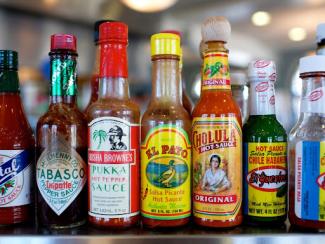
For centuries, we've carried a love for mouth-warming spices. We know a dab of hot sauce can make a simple dish sing, so some keep a bottle in their bags in case of a blandness emergency while dining out.
When millions of Black folks migrated North, they carried hot sauce as a portable taste of home. Keeping the condiment in their bags was for more than just the comfort of down-home cooking. It was often out of necessity.
Traveling during Jim Crow meant we couldn’t dine in most restaurants. Many of us prepared our food at home and packed shoebox lunches to eat peacefully without the threat of racial terror. Keeping utensils, dishes, and condiments for seasoning on the go became customary. But hot sauce did so much more than spice our food.
Spice was crucial for flavor and medicinal purposes. In 1780, enslaved Africans refused to eat bland plantation food, protesting until the plantation owner supplied red pepper pods.
When we break bread together, with or without hot sauce, we continue a centuries-old culinary tradition of feeding our bodies and spirits. Food has long been a way to make homes of places we were never meant to call ours. Carrying hot sauce in our bags is an ode to the culture, and that's the swaggy-est flex of all.